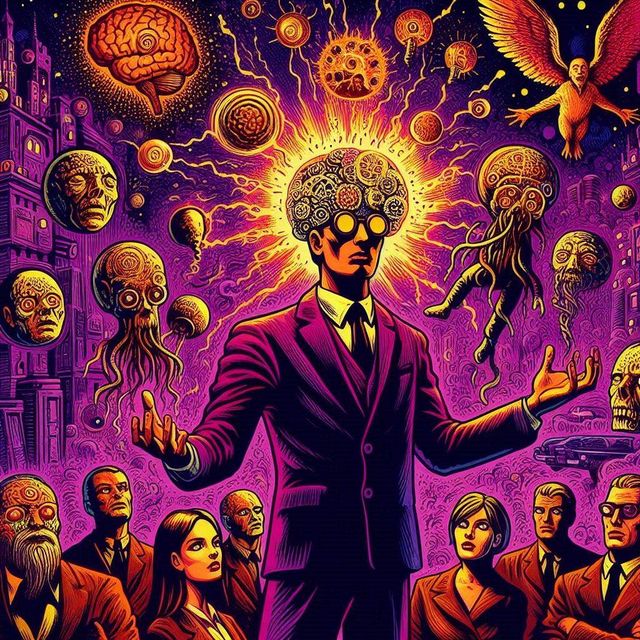-
Vijay Fafat
- Published on
A tale of another way of accessing the fourth dimension. Professor Thelma Beyers had a very long and distinguished career in phrenology and the study of the human brain, having done “outstanding work relating brain structure and chemistry to the social workings of peoples”. But her true obsession was what she liked to call “true magic”. She believed that:
“There are those humans whose neural hardwiring is slightly different, whose perspective allows them to see things that others can’t. These are the ones who with the proper stimulation could recognize their abilities and perform true magic.”
In particular, based on a few anecdotal observations of cats and clothes-dryers, she believed that animate and inanimate objects have a special access to a magical dimension which allows them to perform seemingly impossible tasks. To put this to test, she lured her Ph.D. student, William (the narrator), to participate in a week-long test and by force, locks him up in a room without food and water, tied to concrete platform with a thick chain around his neck. Why?
“Care to venture a guess?” she asked. She smiled and lowered the pistol. I didn’t move.
“First,” she said, “is a subject whose neural hardwiring is skewed from the norm . A subject is needed who has demonstrated the ability to draw on and use information that most people can’t quite see.” Again she pointed the gun at me.
I shook my head. “Not me,” I squeaked.
“Kid,” she said laughingly, “for five years I’ve studied you. I’ve given you problem after problem to solve, always making sure that you never had quite enough facts to draw’ any valid conclusions. Yet, you always saw some correlation in what appeared to be meaningless facts, and were able to draw startling conclusions that were always validated later when I gave you the complete set of data. You knew things that couldn’t be known.”
“I just have a gut feel about things,” I offered feebly. My gut grumbled at me as if to back up my story.
“Don’t sell yourself short, Kid,” she said. “Your mental makeup is the most atypical I’ve ever encountered.
So a few days of food and water deprivation passed by and William started hallucinating. I one such episode, his inner brain took the shape of a toad named Rasputin from the lab and spoke to him:
“How many dimensions do you live in?” asked Rasputin. We had been through this before. I knew the answer that the little bastard wanted to hear. “Four,” I answered. It was pure bullshit, but I’d do anything to get rid of the little toad.
“And they are?” he asked.
“Height, width, depth, and yogurt,” I answered. I had named the fourth dimension myself. It was a direction orthogonal to normal space. You could go in two directions in yogurt space, to the left was orange, and to the right was lemon. This was all pure crap. Rasputin smiled. I was impressed. Smiling was no trivial task for a toad.
“Correct,” said the toad. “My brain only allows me to see a fly that is moving. When the little critter wants to escape my perception it simply stops moving. In the same way, when that cave bear is charging, all you have to do is move into a direction orthogonal to the lower three dimensions, and the cave bear simply can’t see you. If a Neanderthal can do it, so can you!” yelled Rasputin.
It was insane. If I could actually slip into the fourth dimension, I could leave the collar behind, then slip back into normal space somewhere else. It was impossible.
“It would be true magic to the cave bear,” said Rasputin.”
Rasputin / William’s thesis was that such four-dimensional magic was far more prevalent in ancient times, when such abilities were very useful for survival. Over time, animals in societies forgot this skill but some brains retained this racial memory - the main topic of William’s thesis - to be tapped into subconsciously in times of stress.
“Your brain isn’t the next step in human evolution,” said Rasputin. “Your brain is a holdover from a more primitive time. If you think modern life is tough, remember back to a time when you were huddled out on the frozen wastes of Europe, trying to outguess a cave bear that wanted you for dinner. Those were the days when true magic was needed. Those memories and abilities are buried deep within you. Remember your thesis?”
In his delirious state, William got a strong hallucination that he was being charged at by a feral bear inside a cave. The next thing he knew, he was in a hospital being tended to by physicians. He did slip out of his noose by accessing the fourth dimension, proving Thelma’s theory correct…
Of course, he had retained a distinct smell of lemons and oranges… evidently, the fourth spatial dimension could be personalized…
